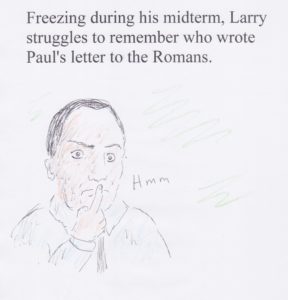God’s commission seemed impossible to Moses, but God reiterated his call (Exod 6:28-30). Before sending him back, he addresses Moses’s fears.
Not only was God far more confident than Moses that Moses would be effective in his commission, but he assured him with strong words. Pharaoh, who considered himself a god, might not want to heed mortals. But as the true God’s messenger, Moses would speak to him as the voice of God, with Aaron being his prophet (Exod 7:1). (Contrary to the views of a few later confused readers, it is clear that God speaks figuratively in terms of Moses and Aaron representing him rather than being him; see v. 2.) In plagues announced through Moses, God would even strike the gods of Egypt (Exod 12:12; Num 33:4), including the household of Pharaoh himself.
Because God knows what he can do through us when he calls us, he can have confidence in his calling for us and our consequent effectiveness. Our effectiveness, of course, comes from him, and is limited to the sphere of our calling, which is not always “success” by the world’s standards. What matters is that it is success by God’s standards. God rarely calls people to do what we can do solely by our own strength; he delights to show his power through vessels that, on their own, appear weak and lowly.
But if such words gave Moses a sense of encouragement, God’s next words would remind him that more tests awaited. Yes, Pharaoh would send God’s people from his land (Exod 7:2). But first God would harden Pharaoh’s heart to not listen, so God could display his wonders in the land (7:3-4). Undoubtedly Moses, like most of us, would prefer for God not to harden Pharaoh’s heart; after all, softening his heart would make things much easier.
But the easier way is not always better. The Lord here declares his reason: Pharaoh’s resistance allows God to respond with signs of judgment—so that the Egyptians might know that he is the Lord (7:4-5; cf. 14:4, 18). God had raised up and allowed to remain this particular, resistant Pharaoh (9:16), and would continue to harden (cf. 4:21; 9:12; 10:1, 20, 27; 14:4) a heart that also chose to be hard (8:15, 32; 9:34).
When we face others’ resistance to God’s plans, we can take courage that God is sovereign, and also take courage that God has a purpose even in events that seem hard for us. For that matter, the delay would be helpful even for the Israelites, who also needed to face testing to learn that the Lord is God (10:2; 16:12).
God knew whom he had chosen; he knew what Moses could be better than Moses did. Thus Moses and Aaron obeyed his command to go again before Pharaoh (7:6).




